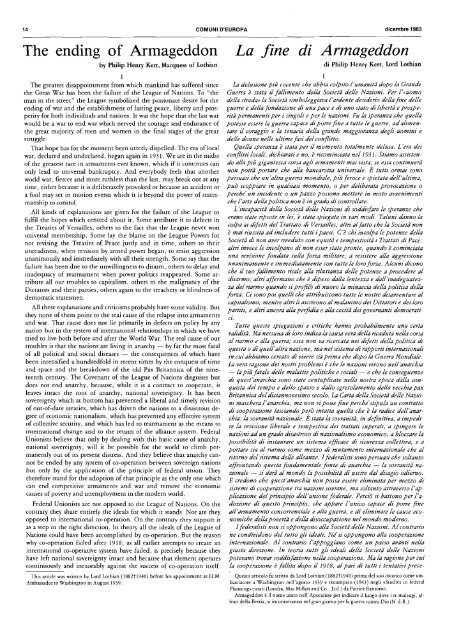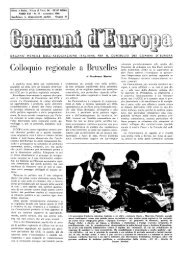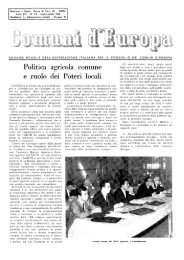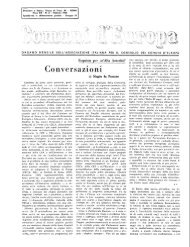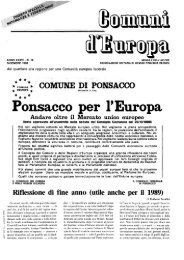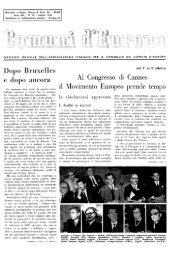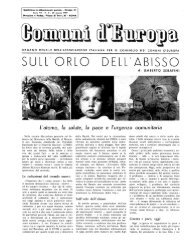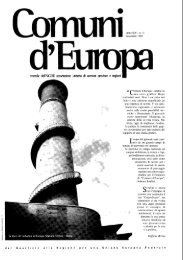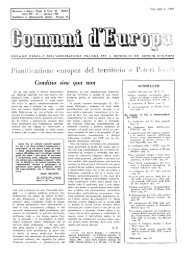Anno XXXI Numero 12 - Sito personale di Renato
Anno XXXI Numero 12 - Sito personale di Renato
Anno XXXI Numero 12 - Sito personale di Renato
You also want an ePaper? Increase the reach of your titles
YUMPU automatically turns print PDFs into web optimized ePapers that Google loves.
14 COMUNI D 'EUROPA <strong>di</strong>cembre 1983<br />
The en<strong>di</strong>ng of Armageddon<br />
by Philip Henry Kerr, Marquess of Lothian<br />
I<br />
The greatest <strong>di</strong>sappointment frorn which mankind has suffered since<br />
the Great War has been the failure of the League of Nations. To "the<br />
man in the street" the League syrnbolized the passionate desire for the<br />
en<strong>di</strong>ng of war and the establishrnent of lasting peace, liberty and pros-<br />
perity for both in<strong>di</strong>viduals and nations. It was the hope that the last war<br />
would be a war to end war which nerved the courage and endurance of<br />
the great rnajority of men and wornen in the fina1 stages of the great<br />
struggle.<br />
That hope has for the rnoment been utterly <strong>di</strong>spelled. The era of local<br />
war, declared and undeclared, began again in 193 1. We are in the rnidst<br />
of the greatest race in armaments ever known, which if it continues can<br />
only lead to universal batlkruptcy. And everybody feels that another<br />
world war, fiercer and more ruthless than the last, rnay break out at any<br />
tirne, either because it is deliberately provoked or because an accident or<br />
a fool rnay set in rnotion events which it is beyond the power of states-<br />
rnanship to control.<br />
Al1 kinds of explanations are given for the failure of the League to<br />
fulfil the hopes which centred about it. Some attribute it to defects in<br />
the Treaties of Versailles, others to the fact that the League never won<br />
universal rnernbership. Some lay the blarne on the League Powers for<br />
not revising the Treaties of Peace justly and in tirne, others to their<br />
unrea<strong>di</strong>ness, when revision by arrned power began, to resist aggression<br />
unanimously and irnrne<strong>di</strong>ately with al1 their strength. Some say that the<br />
failure has been due to the unwillingness to <strong>di</strong>sarrn, others to delay and<br />
inadequacy of rearrnament when power politics reappeared. Some at-<br />
tribute al1 our troubles to capitalisrn, others to the rnalignancy of the<br />
Dictators and their parties, others again to the treachery or blindness of<br />
democratic statesrnen.<br />
Al1 these explanations and criticisrns probably have some vali<strong>di</strong>ty. But<br />
they none of thern point to the reai cause of the relapse into arrnaments<br />
and war. That cause does not lie prirnarily in defects on policy by any<br />
nation but in the systern of international relationships in which we have<br />
tried to live both before and after the World War. The rea1 cause of our<br />
troubles is that the nations are living in anarchy - by far the most fatal<br />
of al1 political and social <strong>di</strong>seases - the consequences of which have<br />
been intensified a hundredfold in recent times by the conquest of tirne<br />
and space and the breakdown of the old Pax Britannica of the nine-<br />
teenth century. The Covenant of the League of Nations <strong>di</strong>sguises but<br />
does not end anarchy, because, while it is a contract to cooperate, it<br />
leaves intact the root of anarchy, national sovereignty. It has been<br />
sovereignty which at bottom has prevented a liberal and tirnely revision<br />
of out-of-date treaties, which has driven the nations to a <strong>di</strong>sastrous de-<br />
gree of economic nationalisrn, which has prevented any effective system<br />
of collective security, and which has led to rearrnament as the rneans to<br />
international change and to the return of the alliance systern. Federal<br />
Unionists believe that only by dealing with this basic cause of anarchy,<br />
national sovereignty, will it be possible for the world to clirnb per-<br />
manently out of its present <strong>di</strong>stress. And they believe that anarchy can-<br />
not be ended by any system of co-operation between sovereign nations<br />
but only by the application of the principle of federal union. They<br />
therefore stand for the adoption of that principle as the only one which<br />
can end competitive armaments and war and rernove the econornic<br />
causes of poverty and unemployment in the modern world.<br />
Federal Unionists are not opposed to the League of Nations. On the<br />
contrary they share entirely the ideals for which it stands. Nor are they<br />
opposed to international co-operation. On the contrary they support it<br />
as a step in the right <strong>di</strong>rection. In theory al1 the ideals of the League of<br />
Nations could have been accomplished by co-operation. But the reason<br />
why co-operation failed after 1918, as al1 earlier attempts to create an<br />
international co-operative system have failed, is precisely because they<br />
have left national sovereignty intact and because that element operates<br />
continuously and inexorably against the success of co-operation itself.<br />
This article was writteri by Lord Lothian (1882t1940) before his appointment as H.M.<br />
Amhassador to Washington in August 1939.<br />
La fine <strong>di</strong> Armageddon<br />
<strong>di</strong> Philip Henry Kerr, Lord Lothian<br />
I<br />
La deksione piiì cocente che abbia colpito l'umanità dopo la Grande<br />
Guerra è stata il fallimento della Società delle Nazioni. Per l'«uomo<br />
della strada» la Società simboleggiava l'ardente desiderio della fine delle<br />
guerre e della fondazione <strong>di</strong> una pace e <strong>di</strong> uno stato <strong>di</strong> libertà e prospen'tà<br />
permanenti per i singoli e per le nazioni. Fu la speranza che quella<br />
potesse essere la guerra capace <strong>di</strong> porre fine a tutte le guerre, ad alimentare<br />
il coraggio e la tenacia della grande maggioranza degli uomini e<br />
delle donne nelle ultime fasi delconflitto.<br />
Quella speranza è stata per il momento totalmente delusa. L'era dei<br />
conflitti locali, <strong>di</strong>chiarati e no, è n'cominciata nel 1931. Stiamo assistendo<br />
alla pii2 gigantesca corsa agli armamenti mai vista; se essa continuerà<br />
non potrà portare che alla bancarotta universale. E tutti ormai sono<br />
persuasi che un 'altra guerra mon<strong>di</strong>ale, piiì feroce e spietata dell'ultima,<br />
può scoppiare in quafszasi momento, o per deliberata provocazione o<br />
perché un incidente o un pazzo possono mettere in moto avvenimenti<br />
che l'arte della politica non è in grado <strong>di</strong> controllare.<br />
L'incapacità della Società delle Nazioni <strong>di</strong> sod<strong>di</strong>sfare le speranze che<br />
erano state riposte in lei, è stata spiegata in vari mo<strong>di</strong>. Taluni danno la<br />
colpa ai <strong>di</strong>fetti del Trattato <strong>di</strong> Versailles; altn' alfatto che la Società non<br />
è mai riuscita ad includere tutti i paesi. C'è chi incolpa le potenze della<br />
Società <strong>di</strong> non aver riveduto con equità e tempestività i Trattati <strong>di</strong> Pace;<br />
altri invece le incolpano <strong>di</strong> non esser state pronte, quando è cominciata<br />
una revisione fondata sulla forza militare, a resistere alla aggressione<br />
unanimamente e imme<strong>di</strong>atamente con tutte le loro forze. Alcuni <strong>di</strong>cono<br />
che il suo fallimento d e alla riluttanza delle potenze a procedere al<br />
<strong>di</strong>sarmo; altri affermano che è <strong>di</strong>peso dalla lentezza e dall'inadeguatez-<br />
za del narmo quando si profilò <strong>di</strong> nuovo la minaccia della politica della<br />
forza. Ci sono poi quelli che attn'buiscono tutte le nostre <strong>di</strong>savventure al<br />
capitalismo, mentre altri li ascnvono al malanimo dei Dittatori' e dei loro<br />
partiti, e altri ancora alla perfi<strong>di</strong>a e alla cecità deigovernanti democrati-<br />
ci.<br />
Tutte queste spiegazioni e critiche hanno probabilmente una certa<br />
vali<strong>di</strong>tà. Ma nessuna <strong>di</strong> loro in<strong>di</strong>ca la causa vera della ncaduta nella corsa<br />
al riarmo e alla guerra; essa non va ricercata nei <strong>di</strong>fetti della politica <strong>di</strong><br />
questa o <strong>di</strong> quell'altra nazione, ma nel sistema <strong>di</strong> rapporti internazionali<br />
in cui abbiamo cercato a? vivere sia pn'ma che dopo la Guerra Mon<strong>di</strong>ale.<br />
L*r vera ragione dei nostri problemi è che le nazioni vivono nell'anarchia<br />
-- la piiì fatale delle malattie politiche e sociali - e che le conseguenze<br />
<strong>di</strong> quest'anarchia sono state centuplicate nella nostra epoca dalla con-<br />
quista del tempo e dello spazio e dallo sgretolamento della vecchia pax<br />
Britannica del <strong>di</strong>ciannovesimo secolo. La Carta della Società delle Nazio-<br />
ni maschera l'anarchia, ma non vi pone fine perche'stipula un contratto<br />
<strong>di</strong> cooperazione lasciando però intatta quella che è la ra<strong>di</strong>ce dell'anar-<br />
chia: la sovranità nazionale. È stata la sovranità, in definitiva, a impe<strong>di</strong>-<br />
re la revisione liberale e tempestiva dei trattati superati, a spingere le<br />
nazioni ad un grado <strong>di</strong>sastroso <strong>di</strong> nazionalismo economico, a bloccare la<br />
possibilità <strong>di</strong> instaurare un sistema efficace <strong>di</strong> sicurezza collettiva, e a<br />
portare sia al narmo come mezzo <strong>di</strong> mutamento internazionale che al<br />
ritorno del sistema delle alleanze. I federalisti sono persuasi che soltanto<br />
affrontando questa fondamentale fonte <strong>di</strong> anarchia - la sovranità na-<br />
zionale - si darà al mondo la possibilità <strong>di</strong> uscire dal dtsagio o<strong>di</strong>erno.<br />
E credono che quest'anarchia non possa essere eliminata per mezzo <strong>di</strong><br />
sistemi <strong>di</strong> cooperazione tra nazioni sovrane, ma soltanto attraverso l'ap-<br />
plicazione del princ@io dell'unione federale. Perciò si battono per l'a-<br />
dozione <strong>di</strong> questo principio, che appare l'unico capace <strong>di</strong> porre fine<br />
all'armamento concorrenziale e alla guerra, e <strong>di</strong> eliminare le cause eco-<br />
nomiche della povertà e della <strong>di</strong>soccupazione nel mondo moderno.<br />
I federalisti non si oppongono alla Società delle Nazioni. Al contrario<br />
ne con<strong>di</strong>vidono del tutto gli ideali. Ne'si oppongono alla cooperazione<br />
internazionale. A l contrario l'appoggiano come un passo avanti nella<br />
giusta <strong>di</strong>rezione. In teoria tutti gli ideali della Società delle Nazioni<br />
potevano trovar sod<strong>di</strong>sfazio ne nella cooperazione. Ma la ragione per cui<br />
la cooperazione è fallita dopo il 191 8, al pan' <strong>di</strong> tutti i tentativi prece-<br />
Questo articolo fu scritto da Lord Lothian (188271940) prima del suo incarico come am-<br />
basciatore a Washington nell'agosto 1939 e ristampato (1943) negli uStu<strong>di</strong>es in federal<br />
Planningil curati (Londra, Mac Millan and Co., Ltd.) da Patrick Ransome.<br />
Armageddon è il nome usato nell'Apocalisse per in<strong>di</strong>care il luogo dove i re malvagi, al-<br />
leati della Bestia, si incontreranno nel gran giorno per la guerra contro Dio (N.d.R.).


